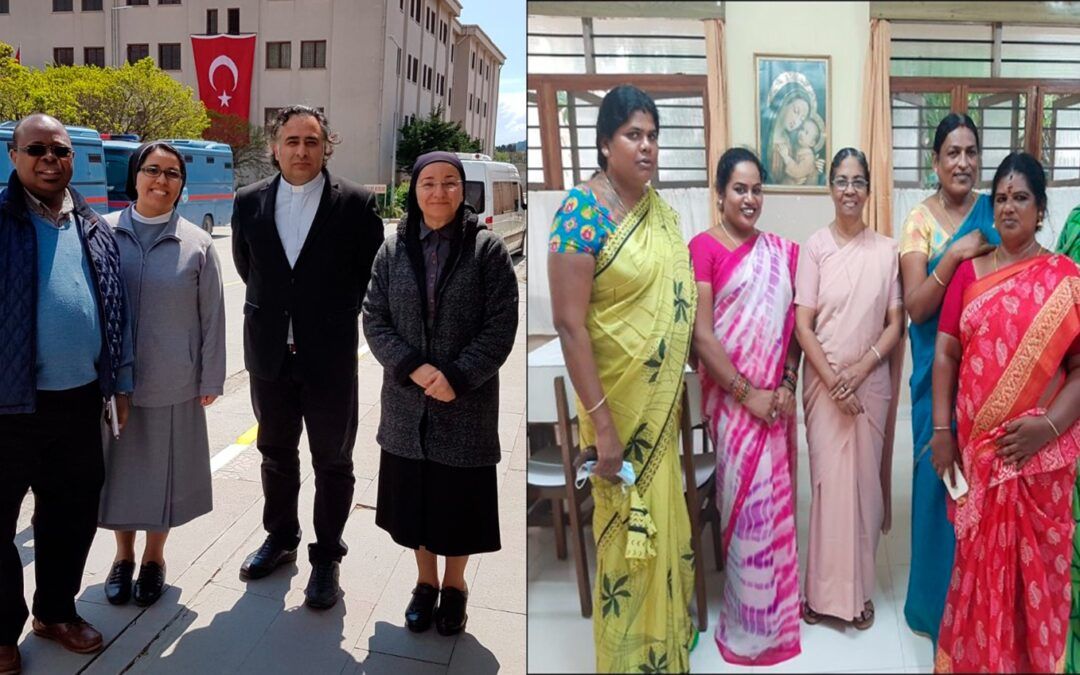On International Women’s Day, we collected the testimonies of Sr Miriam Oyarzo, Franciscan Missionary Sister of the Sacred Heart (FMSC), and Sr. Stella Balthasar, Franciscan Missionary of Mary (FMM), both of whom are committed to serving the most marginalised women.
Since 2015, Sr Miriam Oyarzo has worked with women in Bakirkoy prison, Istanbul, Turkey. “I would like to say that these women are not criminals: they are just victims of a very powerful criminal system, which exploits their poverty and vulnerability,” she says on the phone in a voice full of love for them.
In fact, in 80-90% of the cases, these women were arrested at the airport for drug trafficking. “I am Chilean, and when asked to join this service to assist South American and Spanish-speaking female prisoners, I admit I had many doubts. But when I met these women, these mothers, these desperate and lonely old ladies, I thought it was a discernment of my whole life. So I trusted in Providence and said yes”.
The team of which Sr Miriam is a member is called to “be presence” in the Bakirkoy maximum security prison: “We must first of all listen. Ours is a community of presence, our missionary congregation has an international charism, and this is an ecumenical service. Therefore, a Franciscan friar, Brother Eleuthere Makuta, a Protestant pastor, Ali Kalkandelen, and an Armenian nun, Sr Kayiane Dulkadiryan, also accompany us to the prison. Our task is to be close to the women and to help them practically inside and outside prison”.

The project started about 15 years ago, when the then Director of the prison, showing a genuinely open mind, decided to allow spiritual assistance not only to Turkish or Islamic women but also to foreign women and women of other religions. The Apostolic Vicariate of Istanbul seized this opportunity and, after some refusals by other churches, turned to the Latin Church, particularly the Franciscans.
“It sounds like a platitude, but the first thing that struck me was the loneliness of these women: they are in a high-security prison in a foreign country, and their families can neither see nor hear them. A letter written to their loved ones takes a long time to reach their destination. So they send it to us [in prison, it is forbidden to pass items to visitors], we scan it and email it to their families. In this way, we create a bridge with their families of origin, a more direct dialogue, and we can also show photos of family members, perhaps of their children, to the women prisoners”.
The support does not stop within the prison walls because when the sentence has been served, there is uncertainty about the future. “Behind us is a big network of benefactors: thanks to them, we have managed to get many women back home, or we can assist them here in Istanbul. We welcome them in our convent, and my superior, Sr Zita Gutang, who works in Caritas, greatly helps us. Rehabilitating a person who has come out of prison is very difficult, also because charity cannot be improvised: if a woman ended up in the drug racket or prostitution, it was only out of “need”, out of poverty, out of vulnerability. Often pregnant women are taken because they cannot pass under the scanner, but very often, at the end of a very long journey in which they can neither drink nor eat, they are intercepted anyway, and their freedom stops as soon as they land in Turkey. At the end of their sentence, they have to recreate a new life for themselves, starting with their documents, and we are not afraid to welcome them into our convent, to live with them, to be a living presence at their side because by now they are part of us, and we are part of them”.

Sr. Stella Balthasar lives in India, in the province of Ooty (state of Tamil Nadu), where she is involved with her sisters in the “Empowering Widows” project, which aims to support and help widows, otherwise stigmatised by society because they are considered the bearers of misfortune.
“Indian society regards widows as bad omens: it sees them as ridden with a curse from God. So a widow has to swim through the current of prejudice and overcome obstacles to establish her identity and claim her dignity,” writes Sr Stella.
The project started in 2016 and, in a short time, has involved over 1,500 people in western Tamil Nadu. Supported by the Missionaries of Mary, the widows first became aware of their condition, which was certainly not their fault. They began to oppose the unjust practices to which they were subjected.
“On 23 June 2017, International Widows’ Day of the United Nations, a ceremony was organised by the Nazareth Neela Widows’ Association. During a ceremony at her husband’s funeral, the lady mayor of the city of Ooty gave back to the women what had been taken away from them because of their widowhood. As a result, the people there began to see her no longer as a widow but as a person with full human potential and wealth to contribute to the growth of humanity. This sense of freedom brought great self-confidence and enabled many women to take initiatives to improve their economic condition through small trades, savings for the future, courage to defy harassment in the workplace, and collective strength and mutual support. They also performed communal services such as cleaning the streets, planting trees in public places and spreading ecological awareness among the public. The movement is gradually and steadily growing”.


